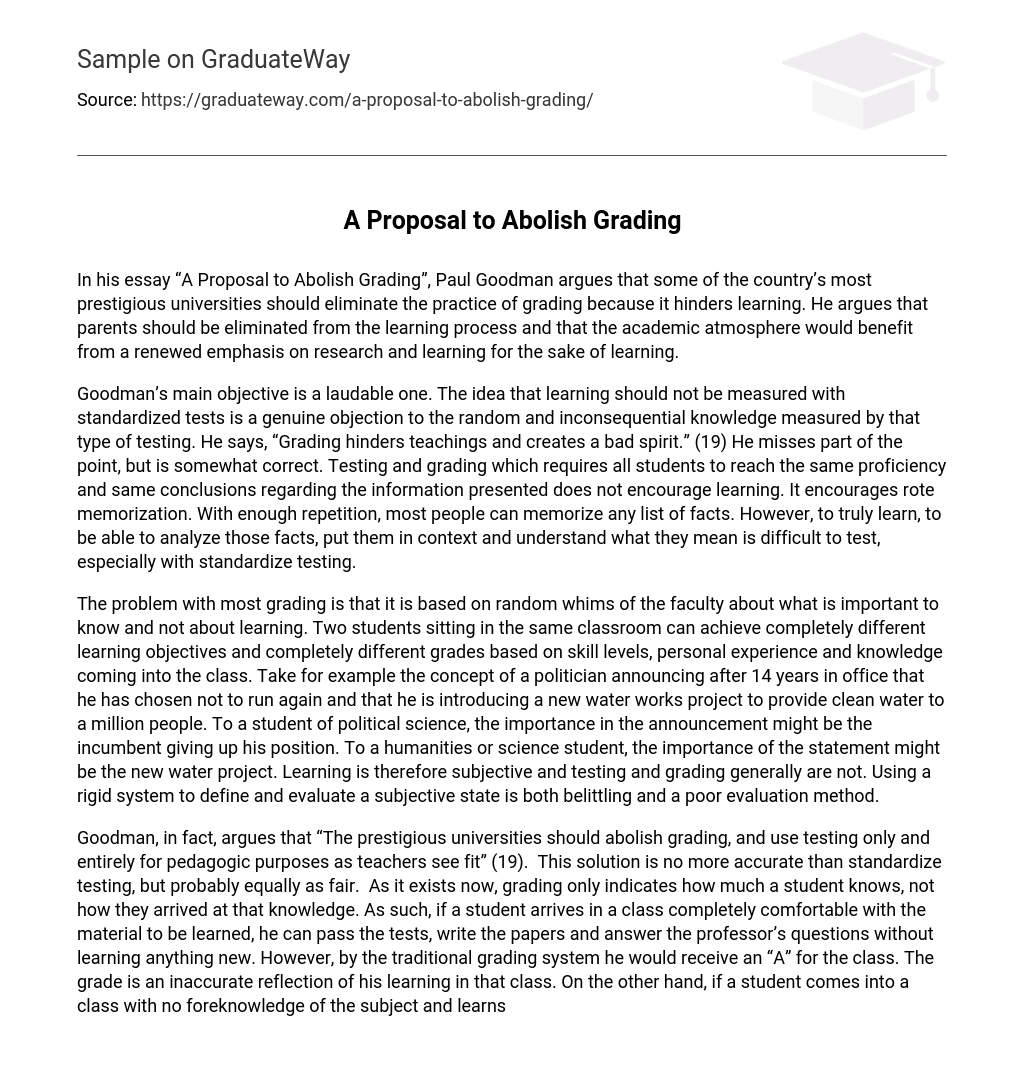In his essay “A Proposal to Abolish Grading”, Paul Goodman argues that some of the country’s most prestigious universities should eliminate the practice of grading because it hinders learning. He argues that parents should be eliminated from the learning process and that the academic atmosphere would benefit from a renewed emphasis on research and learning for the sake of learning.
Goodman’s main objective is a laudable one. The idea that learning should not be measured with standardized tests is a genuine objection to the random and inconsequential knowledge measured by that type of testing. He says, “Grading hinders teachings and creates a bad spirit.” (19) He misses part of the point, but is somewhat correct. Testing and grading which requires all students to reach the same proficiency and same conclusions regarding the information presented does not encourage learning. It encourages rote memorization. With enough repetition, most people can memorize any list of facts. However, to truly learn, to be able to analyze those facts, put them in context and understand what they mean is difficult to test, especially with standardize testing.
The problem with most grading is that it is based on random whims of the faculty about what is important to know and not about learning. Two students sitting in the same classroom can achieve completely different learning objectives and completely different grades based on skill levels, personal experience and knowledge coming into the class. Take for example the concept of a politician announcing after 14 years in office that he has chosen not to run again and that he is introducing a new water works project to provide clean water to a million people. To a student of political science, the importance in the announcement might be the incumbent giving up his position. To a humanities or science student, the importance of the statement might be the new water project. Learning is therefore subjective and testing and grading generally are not. Using a rigid system to define and evaluate a subjective state is both belittling and a poor evaluation method.
Goodman, in fact, argues that “The prestigious universities should abolish grading, and use testing only and entirely for pedagogic purposes as teachers see fit” (19). This solution is no more accurate than standardize testing, but probably equally as fair. As it exists now, grading only indicates how much a student knows, not how they arrived at that knowledge. As such, if a student arrives in a class completely comfortable with the material to be learned, he can pass the tests, write the papers and answer the professor’s questions without learning anything new. However, by the traditional grading system he would receive an “A” for the class. The grade is an inaccurate reflection of his learning in that class. On the other hand, if a student comes into a class with no foreknowledge of the subject and learns even 75 percent of the material presents, he has learned much more form the class, but the grades do not reflect which student learned more from the class.
If we are unwilling to abandon the grading system altogether, then we should more accurately define what it measures. To say that a person passed a class because they had the knowledge a professor deemed appropriate is much more accurate than saying he got an “A” for the things he learned in the class. To say that grades reflect the amount of knowledge a student had accumulated on the day the test was given is a more accurate statement than to claim that grades reflect wither the learning or effort put into a particular course.
In short, the traditional grade system should be abolished, not because it causes students to compete with one another or because it causes animosity toward teachers as Goodman suggested. Instead, grading should be eliminated because it fails in its mission to evaluate the amount of learning being accomplished. Until grading become reliant on individual conversations evaluating the knowledge at the beginning and end of the course, and until it can be done completely in a vacuum, so that no other outside sources may influence the rate of learning, grading must be abandoned as an outmoded dinosaur of a bygone era.
Works Cited
Goodman, Paul. “A Proposal to Abolish Grading.” Current Issues and Enduring Questions: A Guide to Critical Thinking and Argument, with Readings. Boston:Bedford/St. Martin’s, 1981. 19-22.





